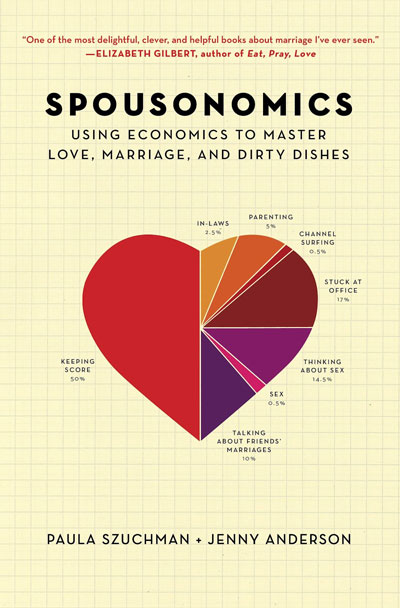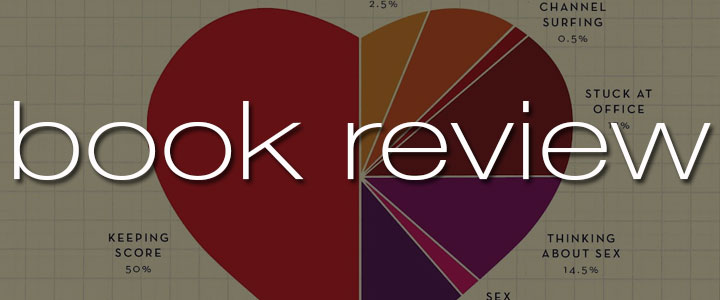
Spousonomics: Using Economics to Master Love, Marriage, and Dirty Dishes
by Jenny Anderson, Paula Szuchman
Published: February 8, 2011
Genres: Non-fiction
Format: eBook (335 pages)
Source: Purchased
moreAre you happy in your marriage—except for those weekly spats over who empties the dishwasher more often? Not a single complaint—unless you count the fact that you haven’t had sex since the Bush administration? Prepared to be there in sickness and in health—so long as it doesn’t mean compromising? B...
Spousonomics is a marriage book that appeals to the logical side of your brain, written with a lot of sarcasm and humor to make it fun to read. I liked that it didn’t go into “feelings” and crap (and thank heavens there was no personal quiz/workbook at the end). It focuses on practical ways to solve common marriage problems with economic principals. It doesn’t seem like economics should be applicable to marriage, but economics is the study of allocating scarce resources and marriage is full of scarcity. Not enough time, energy, mental capacity, money, sex etc. It talks about weighing the costs and benefits of solutions. Trading with your spouse. In fact, I think taking emotion and feelings out of the problems helps you actually solve them.
Here’s an example from the book. A couple is having a “game of chicken” to see who will break down and go to the grocery store first. The book compares this kind of argument to the Cold War between President Kennedy and President Khrushchev:
Now replace Kennedy and Khrushchev with Joel and Lisa. And replace the nuclear missiles with Joel and Lisa’s refrigerator, which has been empty for three days. Husband and wife are in a standoff, neither one backing down. They’re been ordering in from Gino’s Pizza every night this week, and they’re never had such indigestion in their lives. But god help Joel if he’s going to go to the supermarket..
–Locations 4460-5171, Kindle Edition
So what’s the economic solution to that argument? Answer: Collusion. Collusion means giving up the information you’ve been withholding so you can make an actual compromise. Collusion is actually illegal to do in the business world, but it can work out really nice in a marriage. If each side shares honestly why they won’t go to the grocery store, then they can compromise. Most marriage books would point out that yeah, they need to compromise. And then talk about how important your husband’s feelings are blah blah blah. I like this solution better. Much more practical.
Each chapter discusses an economic principal and how it applies to marriage. Then there are three specific examples, called Case Studies, of how those principles can solve a problem. I found myself relating to a lot of these stories. The burnt out housewife. The house chores no one wants to do. I felt like the case studies gave me ideas instead of preaching to me. Marriage books can be so preachy.
The authors gathered tons of data to write this book because economics is all about making decisions based on data. It’s like Freakonomics for your marriage. I like that it challenged traditional solutions and gender roles. If you want a fresh, interesting way to look at your marriage with creative solutions to common problems, you should check out Spousonomics.
Have you ever had a “game of chicken” with your spouse?
I know I have more than once. But the one that comes to mind right now is the laundry. Before we had our own washer and dryer, we both hated doing the laundry. The person that had to haul our laundry to the laundromat was the loser of our chicken game. How long can you go without clean underwear? I can go for DAYS. Yeah, it’s not exactly mature, but we’ve all done it at one point. And we don’t do that anymore. We help each other with the laundry now.
Content Rating: High, for strong language.
This post contains affiliate links and I receive a small percentage of sales made through these links.
Reading this book contributed to these challenges:










 My name is Jessica. I love to read Young Adult and classic literature. I’ve been a book blogger for six years and I haven’t gotten tired of it yet. I’m a very curious reader. Writing about all the questions and thoughts I had while reading a book is the best hobby ever.
My name is Jessica. I love to read Young Adult and classic literature. I’ve been a book blogger for six years and I haven’t gotten tired of it yet. I’m a very curious reader. Writing about all the questions and thoughts I had while reading a book is the best hobby ever.
Sounds like a really great alternative to all the books about feelings. I’ve had enough of those. Plus the humor and stories sound like it’s a fast enjoyable read.